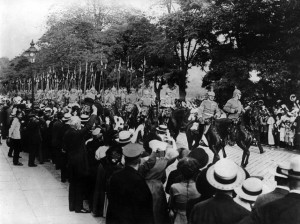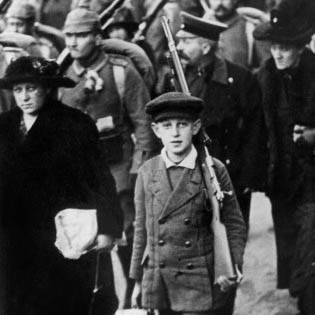The Guns of August

A hundred years ago today the German army mobilized and World War ensued. A flurry of diplomatic efforts to stave off war had been futile. Expectations and motivations of the European powers were underestimated by every party. Misunderstanding was heaped upon misunderstanding, blunders upon blunders, and these inexorably led to unthinkable savagery and carnage.
A century later, one can wonder at how perspectives on this war were unified and the misunderstanding erased. Reading today’s Feuilleton in the Frankfurter Allgemeine you can find a catalog of underlying causes of the war from a German perspective. The list is roughly identical to any list you can read in the anglophone press.
“Die Gründe für all das waren nach Auskunft der Historiker, die zuletzt maßgebliche Bücher dazu vorgelegt haben: Nationalismus im Machtvakuum des einstigen Osmanischen Reiches; ein instabiles Habsburger Reich; ein Blankoscheck der Deutschen, ihm beizustehen; ein ebensolche Unterstützung Russlands für Serbien; Beistandspakte mit europaweiten Dominoeffekten; Rüstungs- und Prestigewettläufe; der Glaube mancher Politiker und Militärs, ein Krieg komme sowieso, die Frage sei nur, wie die Chancen stünden, wenn man sich damit beeile; polit-ökonomisches Nullsummendenken: was eine Nation gewinne, gehe auf Kosten einer anderen; militärische Strategien ohne Plan B; die Illusion, an Weihnachten sei man ohnehin wieder zu Hause.”
Causes of the war, in very rough translation: nationalism and a power vacuum in the Ottoman Empire, instability in the House of Habsburg, a blank check given by Germany to support the Austro-Hungarian Empire and the same given by Russia to Serbia, the existence of military alliances that triggered domino-like declarations of war across Europe, competition for prestige and production of war materiale, the belief by politicians and military leaders that war would come soon in any case and so the only question was to time the war to one’s advantage, a kind of zero-sum-thinking that estimated the cost of the war would be borne by the loser, the absence of any military Plan B, and the illusion that soldiers would be home before Christmas.
That pretty much reflects the book jacket summary of causes of WWI you could read anywhere. This was in a leading German newspaper today—which begs the question: if people can eventually so closely share an understanding from both sides of a conflict, why can’t this shared understanding be found in ten days or ten minutes, instead of ten decades? And how will time and history judge today’s conflicts between Israel and Palestine, the US and Iraq, Nato and the Taliban in Afghanistan? I strongly suspect that some day these conflicts will be viewed as wars that could have been avoided and should have been. Just like World War I a hundred years ago.


